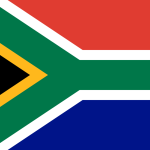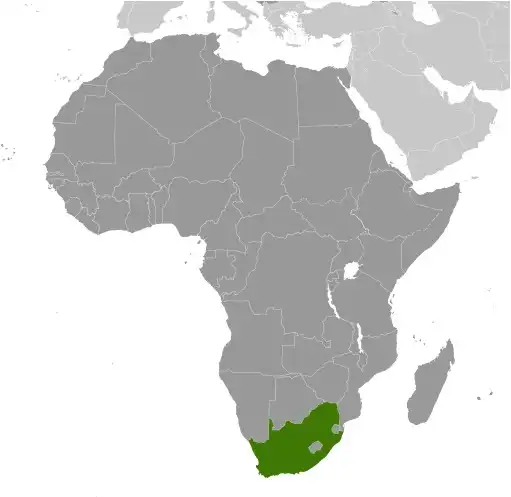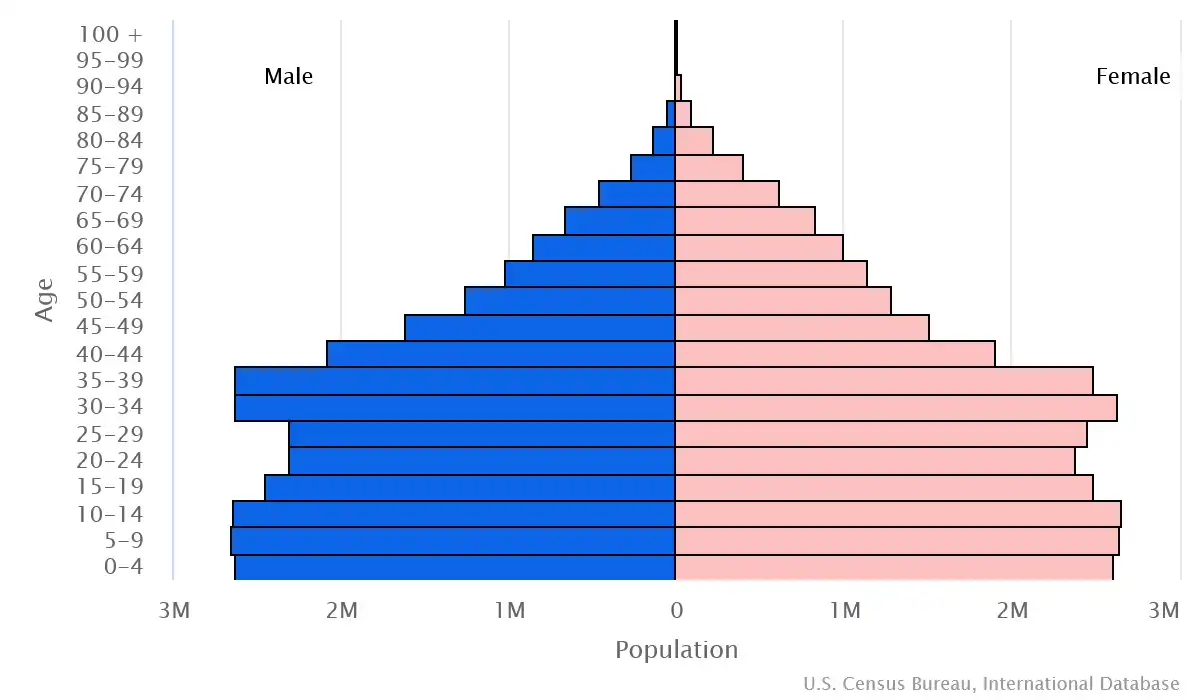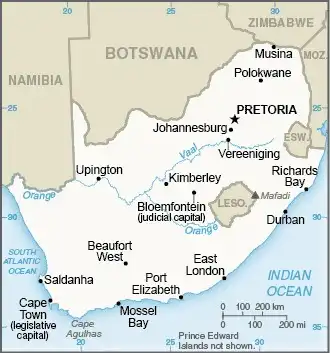
South Africa
Country Data Dashboard

| Government type: | parliamentary republic |
| Capital: | Pretoria (administrative capital); Cape Town (legislative capital); Bloemfontein (judicial capital) |
| Languages: | isiZulu or Zulu (official) 25.3%, isiXhosa or Xhosa (official) 14.8%, Afrikaans (official) 12.2%, Sepedi or Pedi (official) 10.1%, Setswana or Tswana (official) 9.1%, English (official) 8.1%, Sesotho or Sotho (official) 7.9%, Xitsonga or Tsonga (official) 3.6%, siSwati or Swati (official) 2.8%, Tshivenda or Venda (official) 2.5%, isiNdebele or Ndebele (official) 1.6%, other (includes South African sign language (official) and Khoi or Khoisan or Khoe languages) 2% (2018 est.) |
People & Society
Ethnicity (2021 est.)
Religion (2015 est.)
Age structure

Economy
Economic overview
upper middle-income South African economy; hard hit by COVID-19; poor utilities management; key rare earth goods exporter; high income inequality; hosts Africa’s largest stock exchange; rising unemployment, especially youth; land rights changes
Real GDP (purchasing power parity) in Billion $
Real GDP per capita in $
Exports & Imports in billion $
Top 5 Import Partner in 2022 (46%)
Top 5 Import Commodities in 2022
- refined petroleum ⛽
- cars 🚗
- crude petroleum 🛢️
- vehicle parts/accessories 🛠️🚗
- broadcasting equipment 📡
Top 5 Export Partner in 2022 (46%)
Top 5 Export Commodities in 2022
- gold 💰
- platinum 🪙
- coal ⚫
- cars 🚗
- diamonds 💎
Geography
Map

Area
Natural resources
- gold 💰
- chromium 🟩
- antimony 🏺
- coal ⚫
- iron ore ⛓️
- manganese 🪙
- nickel 🪙
- phosphates ⛏️
- tin 🪙
- rare earth elements 🪨🪙💎
- uranium ☢️
- gem diamonds 💎
- platinum 🪙
- copper 🟧🪙
- vanadium 🟦⚙️
- salt 🧂
- natural gas 💨
Climate
mostly semiarid; subtropical along east coast; sunny days, cool nights
Historical Background Information
Some of the earliest human remains in the fossil record were found in South Africa. By about A.D. 500, Bantu-speaking groups began settling into what is now northeastern South Africa, displacing Khoisan-speaking groups to the southwest. Dutch traders landed at the southern tip of present-day South Africa in 1652 and established a stopover point on the spice route between the Netherlands and the Far East, founding the city of Cape Town. After the British seized the Cape of Good Hope area in 1806, many settlers of Dutch descent -- known then as "Boers," or farmers, but later called Afrikaners -- trekked north to found their own republics, Transvaal and Orange Free State. In the 1820s, several decades of wars began as the Zulus expanded their territory, moving out of what is today southeastern South Africa and clashing with other indigenous peoples and the growing European settlements. The discovery of diamonds (1867) and gold (1886) spurred mass immigration, predominantly from Europe.
The Zulu kingdom's territory was incorporated into the British Empire after the Anglo-Zulu War in 1879, and the Afrikaner republics were incorporated after their defeat in the Second South African War (1899-1902). Beginning in 1910, the British and the Afrikaners ruled together under the Union of South Africa, which left the British Commonwealth to become a fully self-governing republic in 1961 after a Whites-only referendum. In 1948, the National Party was voted into power and instituted a policy of apartheid -– billed as "separate development" of the races -- which favored the White minority and suppressed the Black majority and other non-White groups. The African National Congress (ANC) led the resistance to apartheid, and many top ANC leaders such as Nelson MANDELA spent decades in South Africa's prisons. Internal protests and insurgency, as well as boycotts from some Western nations and institutions, led to the regime's eventual willingness to unban the ANC and negotiate a peaceful transition to majority rule.
The first multi-racial elections in 1994 ushered in majority rule under an ANC-led government. South Africa has since struggled to address apartheid-era imbalances in wealth, housing, education, and health care under successive administrations. President Cyril RAMAPHOSA, who was reelected as the ANC leader in 2022, has made some progress in reigning in corruption.
